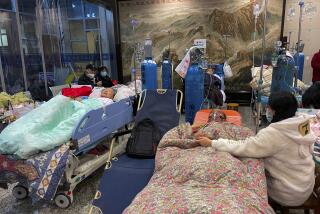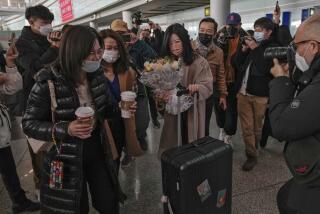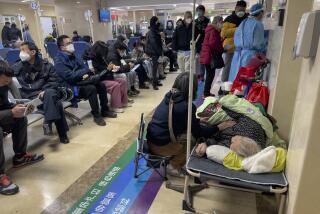Beijing, Taiwan Escalate SARS Fight
- Share via
BEIJING — Authorities in Beijing have ordered all recreational venues in the Chinese capital to close in an effort to prevent the spread of SARS, while Taiwan said today that it would deny entry to visitors from China, Hong Kong, Singapore and Canada, the areas hardest hit by the disease.
Police, commercial and cultural officials moved to shut all of Beijing’s movie theaters, billiards parlors, dance halls, discos, karaoke clubs and even chess rooms, the official New China News Agency reported. Some had already closed as business dwindled because of the outbreak of severe acute respiratory syndrome.
To make sure Beijing’s popular Internet cafes stay shut, the city’s telecommunications bureau cut off their Internet access. No date was given for the businesses to reopen. Restaurants and bars remained open, but were largely empty.
In Taiwan today, the government announced the island’s first SARS death and said it would not issue new visas to visitors from China, Hong Kong, Singapore and Canada. Those with multiple-entry visas will also be barred from the island.
Taiwanese residents returning from the affected areas will be quarantined for 10 days.
“Fighting the epidemic is like fighting a war. We face an invisible enemy,” Prime Minister Yu Shyi-kun told a news conference.
Tsai Ing-wen, Taiwan’s top official in charge of relations with mainland China, said the measures would be short-term. Travel from Taiwan to mainland China and Hong Kong has dropped substantially as the extent of the outbreak became known.
Taiwan’s first SARS death was a 56-year-old man who died Saturday night. He contracted the ailment after his brother visited him. The brother, who lives in Hong Kong, was diagnosed with SARS after returning home weeks ago, officials said.
On Saturday, Taiwanese officials said they had removed about 480 medical workers from Taipei’s Municipal Ho Ping hospital and confined them to military barracks. The hospital was sealed off Friday with 1,100 staff, patients and workers inside after SARS cases were found there.
Since it was discovered in southern China’s Guangdong province in November, the SARS virus has spread around the world, killing at least 290 people and infecting about 4,800 people in 26 countries.
In Hong Kong, the region initially hardest hit by the disease, health authorities reported 17 new confirmed cases Saturday, the lowest increase in the territory in several days. Although government officials described the figure as encouraging, they cautioned against any easing up in the fight against SARS.
“I don’t want to give people the impression that with 17, we can begin to celebrate,” Hong Kong Health Director Margaret Chan said. “That’s not the message. The message is that we must maintain our efforts to contain this terrible disease.”
Six deaths were also reported in Hong Kong, including a 38-year-old nurse who contracted the disease late last month while treating SARS patients. His death is likely to heighten strains between the territory’s hard-pressed doctors and nurses and the government hospital authority, which has been accused of not doing enough to protect medical personnel.
There was also concern that four of the six victims listed Saturday were 45 or under and that all but one had been in good health prior to catching SARS.
Asian health ministers met in Kuala Lumpur, Malaysia, on Saturday and reached agreement on a plan to improve screening of travelers at international departure points, prohibit travel by people with SARS symptoms and require health forms for visitors from affected countries.
“The threat posed by SARS is unprecedented,” Shigeru Omi, head of the World Health Organization’s Western Pacific regional office, told the meeting.
“The virus has already demonstrated its explosive power to cause sudden outbreaks in a large number of countries. Tourism has almost disappeared. Normal life has been seriously disrupted,” Omi said.
Leaders from several Southeast Asian countries are scheduled to meet Tuesday in Bangkok, Thailand, to address the issue.
Singapore also reported another SARS-related death Saturday -- an 18-month-old girl, the youngest of 18 fatalities there so far. The city-state has quarantined nearly 2,800 people and threatened six-month jail terms or fines of up to $5,600 for SARS patients who try to leave their homes.
Beijing’s acting mayor, Wang Qishan, told foreign business representatives Saturday that the city was preparing to publicize the number of people quarantined. A Beijing health official estimated Friday that about 4,000 people had been isolated to date. Wang replaced Meng Xuenong, who was fired last Sunday. “If we publicize all statistics, including the number of those quarantined, there will be no basis for the spreading of rumors,” state media quoted Wang as telling Beijing representatives from Proctor & Gamble, Motorola and other multinationals.
Wang also said that the city is planning construction of a 1,000-bed suburban “field hospital” to meet rising demand. Medical workers say that beds in the six Beijing hospitals designated to treat SARS are becoming scarce.
After a week of double- and triple-digit increases, Beijing announced 113 new SARS cases and six new fatalities Saturday. They brought the city to a total of 988 cases and 113 deaths -- reflecting both new cases and suspected cases that had been confirmed. The city also added 173 more suspected cases, bringing their total to 1,093.
In several Beijing hospitals and residences, quarantined residents waited out their two-week isolation as officials and neighbors passed them food.
The order to close entertainment venues came as Premier Wen Jiabao toured residential districts, construction sites and markets and ate lunch with students in Beijing University’s cafeteria in a bid to restore residents’ confidence. Vice Premier Wu Yi, China’s top official in charge of the SARS crisis, accompanied Wen on the tour. Wu was officially named health minister Saturday, replacing Zhang Wenkang, who was sacked a week earlier.
Meanwhile, media reports of migrant laborers being quarantined on arrival in their hometowns appeared to have deterred some laborers from joining the exodus from Beijing.
“Now I’m getting cold feet about going home,” said one young migrant from eastern Shandong province. “After all the trouble I went through to get a train ticket, I’d probably be safer in Beijing.”
*
Special correspondent Kuhn reported from Beijing and Times staff writer Marshall from Hong Kong.
More to Read
Sign up for Essential California
The most important California stories and recommendations in your inbox every morning.
You may occasionally receive promotional content from the Los Angeles Times.













